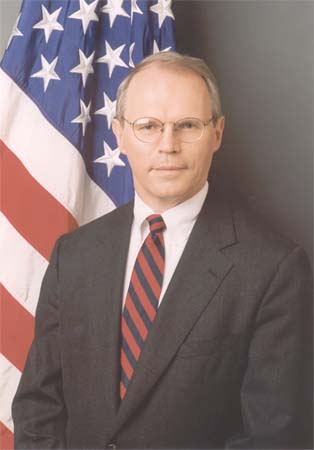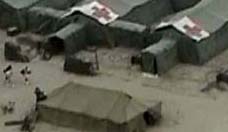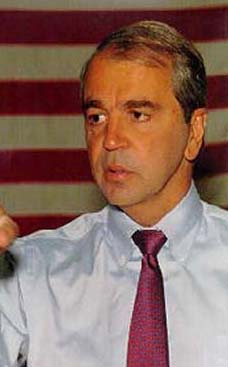
In practice, the unwieldy structure made the give-and-take of actual bargaining impossible. Pyongyang, which had little interest in quickly bartering away its nuclear card, had a field day driving wedges between the United States and its partners. And it used the time since the collapse of the nuclear freeze agreement in 2002 to manufacture plutonium for possibly six to eight more warheads. Christopher R. Hill, assistant secretary of state for East Asian and Pacific Affairs and former U.S. ambassador to South Korea, served as a Peace Corps Volunteer in Cameroon.
The chief U.S. envoy, Christopher R. Hill, spent more time in direct talks with his North Korean counterpart this past week than took place over the entire 2 1/2 years of the six-party talks
Closed door opens a bit in U.S.-N. Korea spat
By Daniel Sneider
Two months ago I wrote that a ``small crack in the other closed door between the United States and North Korea'' was visible. That crack is now wide enough to bring a sliver of light into a dark room.
As I write, negotiators from the United States, North Korea, South Korea, China, Japan and Russia are working away in Beijing on the text of a joint document stating the principles that would underlie a deal to shut down North Korea's nuclear weapons program. If they succeed, the six-party talks are likely to recess to allow officials to head back to their capitals to prepare for the next stage.
The main protagonists -- the United States and North Korea -- have not moved much beyond long-fixed positions. The path to an agreement that verifiably rolls back Pyongyang's nuclear program, and that can be sold back in Washington, D.C., is perilously narrow, with steep cliffs on both sides.
If the talks proceed, it will become clear that China and South Korea, the key partners in this process, are prepared to settle for something less than what the United States wants. Any conceivable deal will repeat, with less wiggle room, the 1994 Agreed Framework that froze North Korea's program. That agreement was vilified by the Bush administration as weak, ``rewarding bad behavior'' by providing nuclear power plants and other aid.
It remains for North Korea to prove it will trade its nuclear weapons for some less explosive form of security. And for President Bush to swallow his moral distaste for North Korea's Kim Jong Il and accept a deal that leaves his rule in place.
For now, what is significant is that for the first time the two governments are actually engaged in negotiations. The chief U.S. envoy, Christopher R. Hill, spent more time in direct talks with his North Korean counterpart this past week than took place over the entire 2 1/2 years of the six-party talks.
This reverses the administration's longstanding insistence that all negotiations must take place only with all six parties present. This was aimed at bringing the force of all the other parties to bear on North Korea and to make it impossible for them to play one against another.
In practice, the unwieldy structure made the give-and-take of actual bargaining impossible. Pyongyang, which had little interest in quickly bartering away its nuclear card, had a field day driving wedges between the United States and its partners. And it used the time since the collapse of the nuclear freeze agreement in 2002 to manufacture plutonium for possibly six to eight more warheads.
The involvement of China, South Korea and Japan is crucial, particularly when it comes to putting incentives such as the supply of electricity and economic aid on the table. But those governments have consistently urged the Americans to go into a room alone with the North Koreans.
Even now the State Department claims these are not ``negotiations,'' just ``bilateral contacts'' of a type that have gone on in past six-party meetings.
That stretches the truth to a breaking point. During the first Bush term, the chief U.S. negotiator, James Kelly, was indeed authorized to hold what amounted to brief encounters with the North Koreans -- hallway conversations that escalated to a 30-minute meeting in a room with the door open. Kelly had to follow a script vetted by hard-liners, led by Vice President Dick Cheney, who believe that the only solution is to bring down North Korea's communist government.
This time, the real business is between Hill and North Korean negotiator Kim Kye Gwan, who will bring whatever progress they make back to their partners. The North Koreans agreed to return explicitly on the understanding that bilateral talks would take place -- a decision reached finally after a dinner meeting between Hill and Kim.
Secretary of State Condoleezza Rice seems to have used her close ties to Bush to win Hill some room to actually move, including on issues of substance. There are hints of flexibility on thorny issues such as North Korea's secret uranium-enrichment program and how to sequence the series of steps taken by both sides.
But Rice's continued insistence that these are not negotiations suggests she needs to watch her back from attacks by those who see this as a road to capitulation. If these talks break real ground, expect those voices within the administration to rise.
Daniel Sneider is foreign-affairs writer for the Mercury News. His column appears on Sunday. Contact him at dsneider@mercurynews.com.











